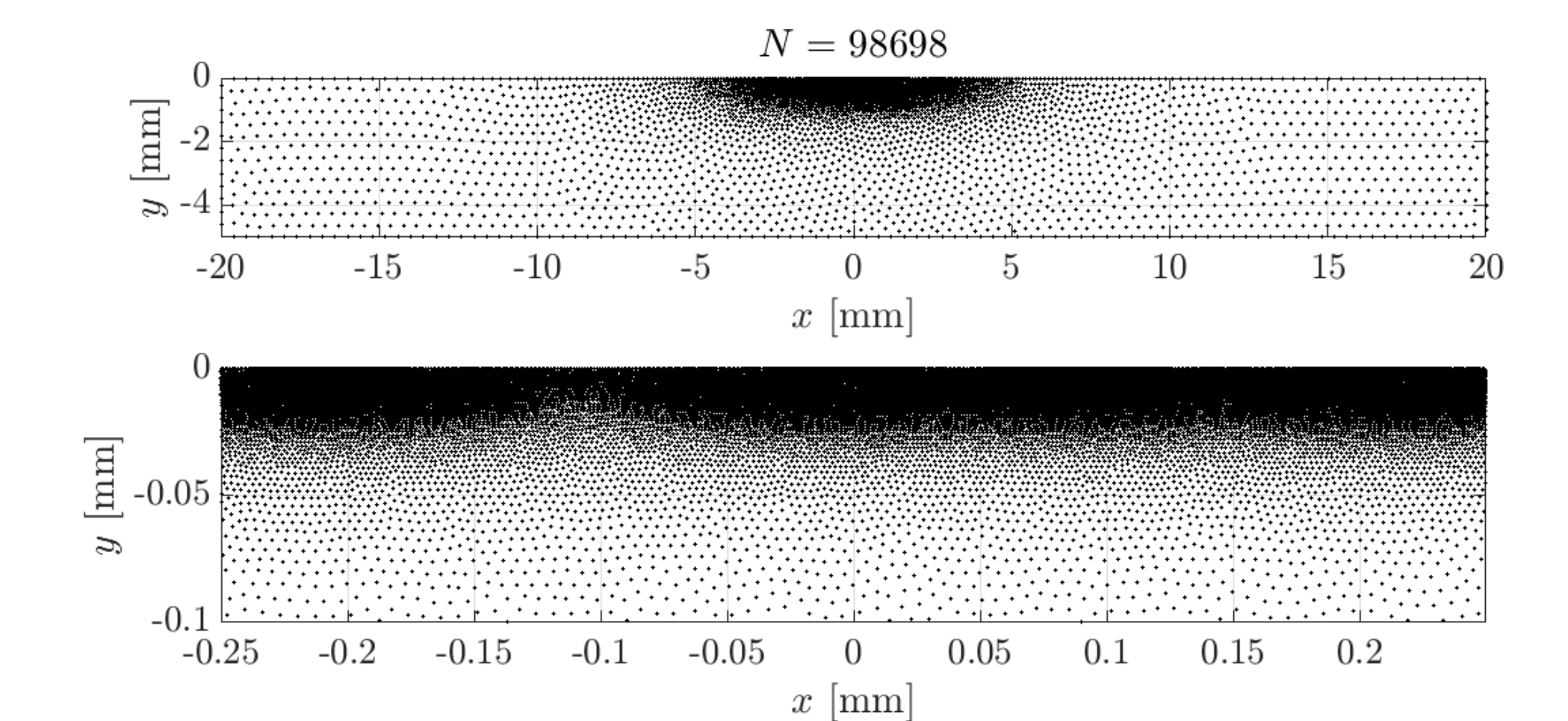Multi-analysis of fretting fatigue using physical and virtual experiments
 Our lab joined the project in July 2016 and started with the execution performance analysis of ABAQUS software that UGent uses to investigate fretting fatigue problem. After extensive testing, with more than 4000 experiments performed, we showed that the ABAQUS environment does not enable satisfactory accelerations with parallel computation under conditions that are required for this project. Therefore, JSI proposed an alternative solution for stress analysis, which is the most cumbersome part of the fretting fatigue simulation, based on local weak and strong form meshless methods. We choose the meshless methods because of their generality regarding the approximation and the position of computational points, both indispensable for dealing with volatile and possible divergent behaviour of stress under the contact and near the crack tip that is always present in fretting fatigue simulations.
We prepared a fully template, and therefore generic, C++ implementation of several concepts that are required by meshless technique, i.e. basis functions, nodal positioning algorithms, approximation engines, differential operators, domains, etc. We paid special attention to the execution performance of each module since there is a common misjudgment that generic implementations introduce severe overheads in the execution. We confirmed that our code executes without any additional overhead by means of analyzing the low-level CPU counters. It is also worth mentioning that the developed implementation is coordinate-free, which is achieved by combining the generality of the meshless method with the generic C++ programming language.
Our lab joined the project in July 2016 and started with the execution performance analysis of ABAQUS software that UGent uses to investigate fretting fatigue problem. After extensive testing, with more than 4000 experiments performed, we showed that the ABAQUS environment does not enable satisfactory accelerations with parallel computation under conditions that are required for this project. Therefore, JSI proposed an alternative solution for stress analysis, which is the most cumbersome part of the fretting fatigue simulation, based on local weak and strong form meshless methods. We choose the meshless methods because of their generality regarding the approximation and the position of computational points, both indispensable for dealing with volatile and possible divergent behaviour of stress under the contact and near the crack tip that is always present in fretting fatigue simulations.
We prepared a fully template, and therefore generic, C++ implementation of several concepts that are required by meshless technique, i.e. basis functions, nodal positioning algorithms, approximation engines, differential operators, domains, etc. We paid special attention to the execution performance of each module since there is a common misjudgment that generic implementations introduce severe overheads in the execution. We confirmed that our code executes without any additional overhead by means of analyzing the low-level CPU counters. It is also worth mentioning that the developed implementation is coordinate-free, which is achieved by combining the generality of the meshless method with the generic C++ programming language.
The first numerical test solved with our in-house software was focused on the solution of Navier Cauchy equation. We solved a Hertzian contact problem, where the domain is discretized with an original Poisson disk sampling based positioning algorithm and an original algorithm for the repeated refinement of the discretization under the contact area. The main contribution of this work is a demonstration that with proposed strong form meshless methods, one can efficiently solve linear elasticity problem with high-stress concentrations on geometrically irregular domains, which cannot be found in the existing literature. We also compared the behaviour of the solution with the more established weak form method (Element Free Galerkin - EFG) and demonstrated that the accuracy vs. execution complexity ratio is the same for both methods. This gives us a solid foundation for further development of an original numerical method and original implementation for fretting fatigue simulation.

In the next step we proposed the original adaptive refinement framework using Radial Basis Functions-generated Finite Differences method. The proposed framework is tested on four gradually more complex contact problems, governed by the Cauchy-Navier equations. First, a disk under pressure is considered and the computed stress field is compared to the closed-form solution of the problem to assess the basic behaviour of the algorithm and the influence of free parameters. Second, a Hertzian contact problem, also with a known closed-form solution, is studied to analyzee the proposed algorithm with an ad-hoc error indicator and to test both refinement and de-refinement. A contact problem, typical for fretting fatigue, with no known closed-form solution is considered and solved next. It is demonstrated that the proposed methodology can be used in practical application and produces results comparable with FEM without the need for manual refinement or any human intervention. In the last case, the generality of the proposed approach is demonstrated by solving a 3-D Boussinesq’s problem of the concentrated normal traction acting on an isotropic half-space.

The algorithm presented requires discretization technique that can generate locally regular node layouts with spatially variable nodal density for interiors of arbitrary domains in two, three and higher dimensions. We devised such an algorithm based on the Poisson Disk Sampling method. We demonstrated that the generated node distributions are suitable to use in the RBF-FD method, which is demonstrated by solving complex non-linear problems in 2D and 3D. Additionally, local minimal spacing guarantees are proven for both uniform and variable nodal densities. The presented algorithm has time complexity O(N) to generate N nodes with constant nodal spacing and O(NlogN) to generate variably spaced nodes. Comparison with existing algorithms is performed in terms of node quality, time complexity, execution time and PDE solution accuracy.


Partners
Universiteit Gent - Ghent University (UGent)
Jozef Stefan Institute (JSI)
P-Lab team
Funding



Publications
A1 papers
- Bhatti, N, Pereira, K and M Abdel Wahab, A continuum damage mechanics approach for fretting fatigue under out of phase loading. Tribology International, 2018. 117: p. 39 - 51 (IF: 2.903; Quartile: Q1, Category: Mechanical Engineering)
- Bhatti, N.A. and M. Abdel Wahab, Fretting fatigue crack nucleation: A review. Tribology International, 2018. 121: p. 121 - 138 (IF: 2.903; Quartile: Q1, Category: Mechanical Engineering).
- Bhatti, N and M Abdel Wahab, Fretting fatigue damage nucleation under out of phase loading using a continuum damage model for non - proportional loading. Tribology International, 2018. 121: p. 204 - 213 (IF: 2.903; Quartile: Q1, Category: Mechanical Engineering).
- Pereira, K and M Abdel Wahab, Fretting fatigue crack propagation lifetime prediction in cylindrical contact using an extended MTS criterion for non - proportional loading. Tribology International, 2017. 115: p. 525 - 534 (IF: 2.903; Quartile: Q1, Category: Mechanical Engineering).
- Bhatti, N and M Abdel Wahab, A numerical investigation on critical plane orientation and initiation lifetimes in fretting fatigue under out of phase loading conditions. Tribology International, 2017. 115: p. 307 - 318 (IF: 2.903; Quartile: Q1, Category: Mechanical Engineering).
- Pereira, K, Yue, T and M Abdel Wahab, Multiscale analysis of the effect of roughness on fretting wear. Tribology International, 2017. 110: p. 222 - 231 (IF: 2.903; Quartile: Q1, Category: Mechanical Engineering).
- Bhatti, N and M Abdel Wahab, Finite element analysis of fretting fatigue under out of phase loading conditions. Tribology International, 2017. 109: p. 552 - 562 (IF: 2.903; Quartile: Q1, Category: Mechanical Engineering).
- Pereira, K, Bordas, S, Tomar, S, Trobec, R, Depolli, M, Kosec, G and M Abdel Wahab, On the Convergence of Stresses in Fretting Fatigue. MATERIALS, 2016. 9: p. 639; doi:10.3390/ma9080639 (IF: 2.654; Quartile: Q2, Category: Materials Science).
- Slak, J and G Kosec, Refined meshless local strong form solution of Cauchy - Navier equation on an irregular domain. Engineering analysis with boundary elements, ISSN 0955 - 7997. doi: 10.1016/j.enganabound.2018.01.001 (IF: 1.721; Quartile: Q2, Category: Engineering Multidisciplinary).
- Bui, H, Tomar, S, Courtecuisse, H, Audette, M, Cotin, S and S Bordas, Controlling the error on target motion through real - time mesh adaptation: applications to deep brain stimulation. International Journal for Numerical Methods in Biomedical Engineering, DOI: 10.1002/cnm.2958 (IF 2.192; Quartile: Q1, Category: Mathematical & Computational Biology).
- Agathos, K, Ventura, G, Chatzi, E and S Bordas, Stable 3D XFEM/vector - level sets for non - planar 3D crack propagation and comparison of enrichment schemes. International Journal for Numerical Methods in Engineering, DOI: 10.1002/nme.5611 (IF 2.162; Quartile: Q1, Category: Mathematics & Interdisciplinary Application).
- Deng, J, Zhou, G, Bordas, S, Xiang, C and D Cai, Numerical evaluation of buckling behaviour induced by compression on patch - repaired composites. Composite Structures 2017, 168, 582 - 596. DOI: 10.1016/j.compstruct.2016.12.071 (IF 3.858; Quartile: Q1, Category: Materials Science Composites).
- Hauseux, P, Hale, J and S Bordas, Accelerating Monte - Carlo estimation with derivatives of high - level finite element models. Computer Methods in Applied Mechanics and Engineering 2017, 318, 917 - 936. DOI: 10.1016/j.cma.2017.01.041 (IF 3.949; Quartile: Q1, Category: Mathematics & Interdisciplinary Application).
- Atroshchenko, E, Hale, J, Videla, J, Potapenko, S and S Bordas, Micro - structured materials: Inhomogeneities and imperfect interfaces in plane micropolar elasticity, a boundary element approach. Engineering Analysis with Boundary Elements 2017, 83, 195 - 203. DOI: 10.1016/j.enganabound.2017.07.023 (IF 1.721; ; Quartile: Q2, Category: Engineering Multidisciplinary).
- Nguyen, V, Lian, H, Rabczuk, T and S, Bordas, Modelling hydraulic fractures in porous media using flow cohesive interface elements. Engineering Geology 2017, 225, 68 - 82. DOI: 10.1016/j.enggeo.2017.04.010 (IF 2.569; ; Quartile: Q1, Category: Engineering Geological).
- Akbari, A, Kerfriden, P and S Bordas, On the effect of grains interface parameters on the macroscopic properties of polycrystalline materials. Computers and Structures 2018, 196, 355 - 368. DOI: 10.1016/j.compstruc.2017.09.005 (IF 2.847; ; Quartile: Q1, Category: Engineering Civil).
- Xu, G, Li, M, Mourrain, B, Rabczuk, T, Xu, J and S Bordas, Constructing IGA - suitable planar parameterization from complex CAD boundary by domain partition and global/local optimization. Computer Methods in Applied Mechanics and Engineering 2018, 328, 175 - 200. DOI: 10.1016/j.cma.2017.08.052 (IF 3.949; Quartile: Q1, Category: Mathematics & Interdisciplinary Application).
- Atroshchenko, E, Tomar, S, Xu, G and S Bordas, Weakening the tight coupling between geometry and simulation in isogeometric analysis: from sub- and super- geometric analysis to Geometry Independent Field approximaTion (GIFT). International Journal for Numerical Methods in Engineering, DOI: 10.1002/nme.5778 (IF 2.162; Quartile: Q1, Category: Mathematics & Interdisciplinary Application).
- Pereira, K, Bhatti, N and M Abdel Wahab, Prediction of crack initiation location and direction in fretting fatigue using cohesive zone model, Tribology international, 2018. 127. p.245 - 254 (IF: 2.903; Quartile: Q1, Category: Mechanical Engineering).
- Deng, Q, Bhatti, N and M Abdel Wahab, Numerical Modeling of the Effect of Randomly Distributed Inclusions on Fretting Fatigue - induced Stress in Metals, METALS. 2018. 8(10). (IF: 1.704; Quartile: Q2, Category: Metallurgy & Metallurgical Engineering).
- Kosec, G, Slak, J, Depolli, M, Trobec, R, Pereira, Bordas, S, Tomar, S and M Abdel Wahab, Weak and strong from meshless methods for linear elastic problem under fretting contact conditions, Tribology international, 2019. In Press. (IF: 2.903; Quartile: Q1, Category: Mechanical Engineering).
- Bhatti NA, Pereira K, Abdel Wahab M. Effect of stress gradient and quadrant averaging on fretting fatigue crack initiation angle and life. Tribology international. 2019;131:212–21. (IF: 2.903; Quartile: Q1, Category: Mechanical Engineering).
- Infante - García, D, Giner E, Miguélez H, Abdel Wahab M. Numerical Analysis of the Influence of Micro - voids on Fretting Fatigue Crack Initiation Lifetime. Tribology international. 2019; 135: 121–129. (IF: 2.903; Quartile: Q1, Category: Mechanical Engineering).
- Slak, J, Kosec G, Adaptive radial basis function–generated finite differences method for contact problems, Numerical Methods in Engineering (IF: 2.589, Quartile: Q1, mathematics, interdisciplinary applications, engineering), DOI:https://onlinelibrary.wiley.com/doi/full/10.1002/nme.6067
- Slak, J. and Kosec, G. On Generation of Node Distributions for Meshless PDE Discretizations. SIAM J. Sci. Comput., 2019, 41(5), A3202–A3229.
C1 papers
- Bhatti NA and M Abdel Wahab M. Numerical investigation of contact stresses for fretting fatigue damage initiation. In: Abdel Wahab M, editor. Proceedings of the 6th International Conference on Fracture Fatigue and Wear. UK: IOP Publishing; 2017.
- Pereira K de F, Abdel Wahab M. Minimum shear stress range : a criterion for crack path determination. In: Abdel Wahab M, editor. Proceedings of the 6th International Conference on Fracture Fatigue and Wear. UK: IOP Publishing; 2017.
- Bhatti NA, Abdel Wahab M. A review on fretting fatigue crack initiation criteria. In: Abdel Wahab M, editor. International Journal of Fracture Fatigue and Wear. Ghent, Belgium: Labo Soete, Universiteit Gent; 2016. p. 78–85.
- Pereira K de F, Bordas S, Tomar S, Trobec R, Depolli M, Kosec G, Abdel Wahab M. Cyclic cohesive zone models and its applicability to fretting fatigue crack propagation. In: Abdel Wahab M, editor. International Journal of Fracture Fatigue and Wear. Ghent, Belgium: Labo Soete, Universiteit Gent; 2016. p. 228–33.
- Trobec R, Depolli M, Kosec G, Bordas S, Tomar S, Pereira K de F, Abdel Wahab M. Parallelization approaches for fretting fatigue simulation. In: Abdel Wahab M, editor. International Journal of Fracture Fatigue and Wear. Ghent, Belgium: Labo Soete, Universiteit Gent; 2016. p. 204–8.
- Depolli, M, Trobec, R, Kosec, G, Pereira, K, Abdel Wahab, M, Tomar, S, Bordas, P. Parallel performance of abaqus software for simulation of fretting fatigue. Proceedings of the Fifth International Conference on Parallel, Distributed, Grid and Cloud Computing for Engineering, PARENG 2017, 30-31 May 2017, Pécs, Hungary, (Civil-comp proceedings, ISSN 1759-3433). Stirling: Civil-Comp Press. 2017.
- Kolman, M., Kosec G. A parallel multicore acceleration of a point contact solid mechanics simulation. Proceedings of the Fifth International Conference on Parallel, Distributed, Grid and Cloud Computing for Engineering, PARENG 2017, 30-31 May 2017, Pécs, Hungary, (Civil-comp proceedings, ISSN 1759-3433). Stirling: Civil-Comp Press. 2017
- Resende Pereira K de F, Abdel Wahab M. Effect of short crack behavior on the propagation life prediction for a fretting cylindrical pad configuration. In: Abdel Wahab M, editor. Proceedings of the 7th International Conference on Fracture Fatigue and Wear. Springer Singapore; 2019. p. 539–46.
- Bhatti NA, Resende Pereira K de F, Abdel Wahab M. A comparison between critical-plane and stress-invariant approaches for the prediction of fretting fatigue crack nucleation. In: Abdel Wahab M, editor. Proceedings of the 7th International Conference on Fracture Fatigue and Wear. Springer Singapore; 2019. p. 530–8.
- K. Pereira and M. Abdel Wahab. An implementation of cyclic cohesive zone models in Abaqus and its applicability to predict fatigue lives, International Conference on Damage Assessment of Structures (DAMAS 2019). Springer Singapore, in press (2019).
- Infante-García, D, Giner E, Miguélez H, Abdel Wahab M. Damage assessment in fretting fatigue specimens with micro-voids using critical plane approach, International Conference on Damage Assessment of Structures (DAMAS 2019). Springer Singapore, in press (2019).
- Depolli, M, Trobec, R. Computational efficiency of linear system construction for MLPG method on a multicore computer.
- Slak, J, Kosec, G, Fast generation of variable density node distributions for mesh-free methods, in: Boundary elements and other mesh reduction methods XXXXI, 41st International Conference on Boundary Elements and other Mesh Reduction Methods, September 11–13, 2018, New Forest, UK (eds. A. Cheng and S. Syngellakis), WIT transactions on engineering sciences 122, Wessex institute, WIT press, 2018.
- Kosec, G, Slak, J. Parallel RBF-FD solution of the Boussinesq’s problem, in: Proceedings of the Sixth International Conference on Parallel, Distributed, GPU and Cloud Computing for Engineering, June 5–6, 2019, Pécs, Hungary. Stirlingshire: Civil-Comp Press, 2019.
- Slak, J, Kosec, G. Refined RBF-FD solution of linear elasticity problem. 3rd International Conference on Smart and Sustainable Technologies
- Slak, J, Kosec, G., Generic implementation of meshless local strong form method, in: ECT2018, The Tenth International Conference on Engineering Computational Technology 2018, September 4–8, 2018, Stiges, Barcelona, Spain, Civil-comp proceedings, Elsevier, 2018.




